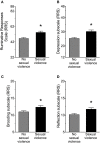Stressful Life Memories Relate to Ruminative Thoughts in Women With Sexual Violence History, Irrespective of PTSD
- PMID: 30233419
- PMCID: PMC6134204
- DOI: 10.3389/fpsyt.2018.00311
Stressful Life Memories Relate to Ruminative Thoughts in Women With Sexual Violence History, Irrespective of PTSD
Abstract
More than one in every four women in the world experience sexual violence (SV) in their lifetime, most often as teenagers and young adults. These traumatic experiences leave memories in the brain, which are difficult if not impossible to forget. We asked whether women with SV history experience stronger memories of their most stressful life event than women without SV history and if so, whether strength relates to ruminative and trauma-related thoughts. Using the Autobiographical Memory Questionnaire (AMQ), women with SV history (n = 64) reported this memory as especially strong (p < 0.001), remembering more sensory and contextual details, compared to women without SV history (n = 119). They further considered the event a significant part of their personal life story. The strength of the memory was highly correlated with posttraumatic cognitions and ruminative thoughts, as well as symptoms of depression and anxiety (p's < 0.001, n = 183). A third (33%) of the women with SV history were diagnosed with posttraumatic stress disorder (PTSD), but PTSD alone did not account for the increase in memory strength (p's < 0.001). These data suggest that the experience of SV increases the strength of stressful autobiographical memories, which are then reexperienced in everyday life during posttraumatic and ruminative thoughts. We propose that the repeated rehearsal of vivid stressful life memories generates more trauma memories in the brain, making the experience of SV even more difficult to forget.
Keywords: PTSD; depression; fear; memory; rumination; sexual violence; stress; trauma.
Figures




Similar articles
-
MAP Training My Brain™: Meditation Plus Aerobic Exercise Lessens Trauma of Sexual Violence More Than Either Activity Alone.Front Neurosci. 2018 Apr 23;12:211. doi: 10.3389/fnins.2018.00211. eCollection 2018. Front Neurosci. 2018. PMID: 29740264 Free PMC article.
-
Posttraumatic Stress Disorder and Autobiographical Memories in Everyday Life.Clin Psychol Sci. 2017 Mar;5(2):325-340. doi: 10.1177/2167702616688878. Epub 2017 Mar 13. Clin Psychol Sci. 2017. PMID: 28781928 Free PMC article.
-
The impact of depression and PTSD symptom severity on trauma memory.Memory. 2018 Jan;26(1):106-116. doi: 10.1080/09658211.2017.1334801. Epub 2017 May 31. Memory. 2018. PMID: 28566056
-
[Memory alterations in post-traumatic stress disorder].Biol Aujourdhui. 2023;217(1-2):55-64. doi: 10.1051/jbio/2023018. Epub 2023 Jul 6. Biol Aujourdhui. 2023. PMID: 37409865 Review. French.
-
[Episodic autobiographical memory in depression: a review].Encephale. 2006 Oct;32(5 Pt 1):781-8. doi: 10.1016/s0013-7006(06)76231-5. Encephale. 2006. PMID: 17099603 Review. French.
Cited by
-
Meditation and Aerobic Exercise Enhance Mental Health Outcomes and Pattern Separation Learning Without Changing Heart Rate Variability in Women with HIV.Appl Psychophysiol Biofeedback. 2022 Mar;47(1):27-42. doi: 10.1007/s10484-021-09530-2. Epub 2022 Jan 17. Appl Psychophysiol Biofeedback. 2022. PMID: 35040014 Free PMC article.
-
Forgetting Unwanted Memories: Active Forgetting and Implications for the Development of Psychological Disorders.J Pers Med. 2021 Mar 26;11(4):241. doi: 10.3390/jpm11040241. J Pers Med. 2021. PMID: 33810436 Free PMC article. Review.
-
Women's experiences of safety apps for sexualized violence: a narrative scoping review.BMC Public Health. 2021 Dec 30;21(1):2330. doi: 10.1186/s12889-021-12292-5. BMC Public Health. 2021. PMID: 34969403 Free PMC article.
References
-
- World Health Organization Global and Regional Estimates of Violence Against Women: Prevalence and Health Effects of Intimate Partner Violence and Non-Partner Sexual Violence. World Health Organization; (2013).
-
- Kessler RC. Posttraumatic stress disorder: the burden to the individual and to society. J Clin Psychiatry (2000) 61:52–6. - PubMed
-
- Greenfeld LA. Sex Offenses and Offenders. Washington, DC: Bureau of Justice Statistics, Department of Justice; (1997).
-
- Krebs C, Lindquist C, Berzofsky M, Shook-Sa B, Peterson K, Planty M, et al. Campus Climate Survey Validation Study Final Technical Report. Washington, DC: Bureau of Justice Statistics, Department of Justice; (2016).
-
- Cantor D, Fisher B, Chibnall S, Townsend R, Lee H, Bruce C, et al. Report on the AAU Campus Climate Survey on Sexual Assault and Sexual Misconduct. Rockville, MD: Association of American Universities; (2015).
LinkOut - more resources
Full Text Sources
Other Literature Sources

